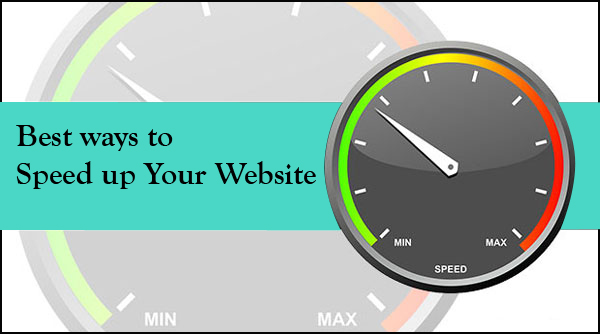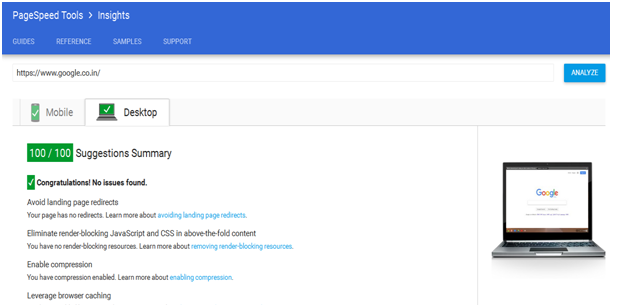
10 Ways to Speed up Your Website
Time is our most valuable asset! This is the reason why we spend more on technology from higher spec smartphone to expensive internet connection to productivity apps and like all these things, the website speed matters too. Nothing is more frustrating than clicking on a website URL and then checking your clock to see how long you’ve been waiting for it to load.
When your customers visit your website, you only have few seconds to capture their attention, with a slow loading website; your entire marketing budget goes to waste when you lose customers on their first visit.
Why page speed is Important for your business?
Here are a few areas that may be affected due to a slow website
– 47% of visitors want your websites to load in fewer than 2 seconds or less.
– 40% of all visitors will bounce if your page takes more than more than 3 seconds to load.
– 14% of your visitors will just shop somewhere else if your website loads too slow.
– 52% of online shoppers say quick page loads are important for their loyalty to a site
Google has mentioned that page speed is a key factor and SEO ranking signal for its algorithm, therefore page speed not only should be considered for your visitors sake to help enhance user experience, but also for traffic and sales making your company more profitable, winning more customers and closing more deals..
Slower websites just don’t affect your search engine ranking; they also affect on your business growth, such as:
1. Customer Experience and Satisfaction.
2. Email Signups.
3. Sales conversions on your product or service pages.
4. Page views from internal traffic.
It would not be wrong to so that fast loading website is not only critical to rank well in Google, but also for your bottom-line, as it impacts your revenue directly.
10 Ways to Speed up Your Website
1. Minimize HTTP Requests:
According to Yahoo, 80% of a Web page’s load time is spent downloading the different pieces-parts of the page: images, style sheets, scripts, flash, etc. An HTTP request is made for each one of these elements, so the more on-page components, the longer it takes for the page to render.
That being the case, the quickest way to improve site speed is to simplify your design.
• Streamline the number of elements on your page.
• Use CSS instead of images whenever possible.
• Combine multiple style sheets into one.
• Reduce scripts and put them at the bottom of the page.
2. Reduce Server Response Time:
Server response time is the time taken by a web server to respond to a request from a browser. As the traffic of your website goes up, the more server resources resulting in a slow and sluggish website.
Google recommends keeping server response time less than 200ms. If you follow all the tips in this article, you are well on your way to reducing the server response time of your website and boosting your website’s performance.
3. Optimize images:
You can improve your website’s performance by speeding up the loading time of your images. For optimizing images, you need to focus on four things: size, format and the src attribute.
A) Image size:
Oversized images take longer to load, so it’s important that you keep your images as small as possible. Use image editing tools to:
B) Format:
• JPEG is your best option.
• PNG is also good, though older browsers may not fully support it.
• GIFs should only be used for small or simple graphics and for animated images.
• Do not use BMPs or TIFFs.
C) Src attributes
Once you’ve got the size and format right, make sure the code is right too. In particular, avoid empty image src codes.
4. Remove Unnecessary Plugins that you use on your site:
If you have a WordPress website, then there are chances you may have installed Plugins that you no longer need. Activating too many Plugins affects website performance, causes security issues, and makes your site slow and sluggish.
At least once a month, review the Plugins on your website and delete the ones you’re not using frequently. GTMetrix will allow you to identify Plugins that are causing speed issues to your website.
5. Enable Browser Cache:
This is very important for returning visitors because every time a visitor comes to your site, their browser downloads all the files such as images, css, java files.
Once you turn on browser cache, the static files are stored on the visitor’s browser so the next time the visitor comes back to the page it will load faster

6. Reduce Redirects for responsive design:
Redirects create additional HTTP requests and increase load time. So you want to keep them to a minimum.
If you’ve created a responsive website, more than likely, you have redirects in place to take mobile users from your main website to the responsive version.
7. Enable compression:
Large pages are often 100kb and more. As a result, they’re bulky and slow to download. The best way to speed their load time is to zip them—a technique called compression. You do this with a tool called Gzip
8. Minify CSS & JavaScript:
If your website uses a lot of JavaScript and CSS files, there’s a high likelihood that your site is telling your visitor’s browser to treat these files individually; this leads to a lot of requests that eventually impacts your site speed negatively. Minifying JavaScript and CSS files reduces the number of individual JavaScript and CSS files, by having them in one place, thus significantly improving your website speed.
9. Regularly Optimize Your Database:
This is an often ignored but very powerful way to boost your website speed; it is especially effective if you use WordPress or any CMS that rely heavily on database usage.
You can make your website much faster by regularly cleaning up your database, a process that can be automated with the WP-Optimize Plugins if you use WordPress
10. Update CMS Regularly:
If you are using WordPress or any other CMS which releases update make sure to check frequently as they include fixes and often help to increase the performance of the website by making them lighter and faster to load.
At TechEnvision we will provide you a free website analysis to improve your website speed according to PageSpeed Insights – Google Developers. In this way you will get clear idea about how to speed up your website in the simplest and cost-efficient way.
To know more call us – 02316620588



